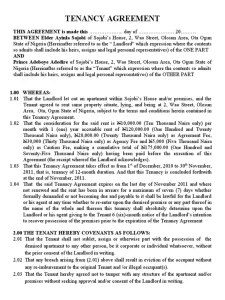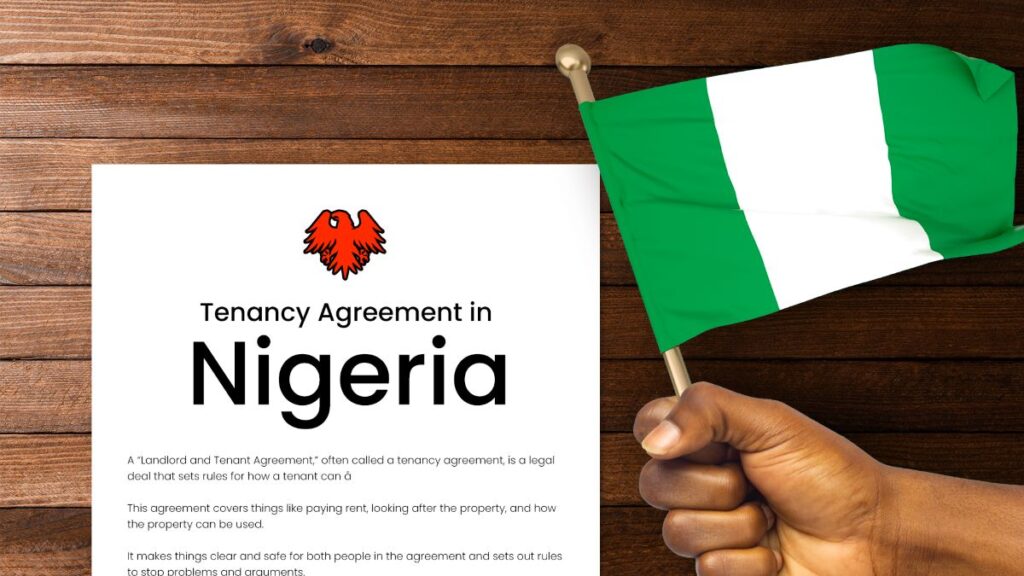Finding a new place to live in Lagos can be quite an adventure!
It’s a bustling, dynamic city where every corner has its own unique flavor.
As someone who has navigated the real estate waters here quite a bit, I can tell you there’s a thrill in scouting out that perfect spot you can call home.
However, before you let the excitement sweep you away, there’s something crucial you need to pause and consider— tenancy agreement.
Now, I know legal documents might not be the most thrilling read, but trust me, understanding your tenancy agreement is key.
It’s not just about the rent you’ll pay; it’s about securing a place that matches your expectations and protects your rights as a tenant.
I’ll explain why it’s so important to grasp the tenancy agreement in Nigeria before you sign on the dotted line. I’ll make it simple and clear!
What is a Tenancy Agreement?
A tenancy agreement is a legal contract between a landlord and a tenant in Nigeria. It outlines the rights and responsibilities of both parties during the rental period.
In simpler terms, it’s like a promise between you and the landlord. It’s a formal document that says, “This is what you can expect from me, and here’s what I expect from you.”
It outlines all the rules about living in the property, how much rent you’ll pay, and for how long you can stay. Think of it as a rule book that helps everyone play fair and know exactly what’s going on.
This agreement isn’t just a bunch of rules to follow; it’s a protective shield for both you and the landlord. For you, it ensures that the landlord can’t just wake up one morning and decide to hike your rent or ask you to leave without a good reason.
For the landlord, it guarantees that they will receive their rent on time and that you’ll take good care of their property.
You know what is cooler than renting a home? It’s owning one!
I mean owning your own home is a dream! A dream you can achieve easily with the DUO rent-to-own scheme.
This scheme allows you to pay your annual rent as equity towards the total cost of owning the property.
So, if you’re looking for an accessible mode of payment for a home that is cheaper than getting a mortgage, and offers the benefit of a locked-in purchase price, then you should be jumping on this opportunity.
You’re welcome!
How to Write a Tenancy Agreement in Nigeria
Creating a tenancy agreement in Nigeria doesn’t have to be complicated, but it’s important to include all the necessary details to protect both the landlord and the tenant. Below, I’ll provide a simple template for a tenancy agreement.
Remember, it’s always a good idea to have a lawyer review your agreement to ensure it complies with local laws and regulations.
Here’s a sample of a tenancy agreement in Nigeria:

This is a basic framework, but depending on the specifics of your property and preferences, you might need to add additional clauses.
Adjustments may include terms for renewing the lease, rules about renovations, or specific details about maintenance responsibilities.
Different Types of Tenancy Agreements in Nigeria
In Nigeria, several types of tenancy agreements cater to different rental situations. Understanding these types can help both landlords and tenants choose the best option for their needs.
Here’s a straightforward rundown of the most common types of tenancy agreements in Nigeria:
- Fixed-Term Lease: This is a popular type of tenancy agreement in which the landlord and tenant agree on a specific duration for renting the property, often for one year or more. The lease details how long you’ll stay and the rent you’ll pay without changes during this period. It is a promise to stay for that set time, and both sides must stick to it unless they both agree to change the terms.
- Periodic Tenancy: This agreement is more flexible. It doesn’t have a fixed end date but continues regularly—like monthly or weekly. This is handy for tenants who don’t want to commit to a long lease and for landlords who need more flexibility. You keep going until either the landlord or the tenant decides to end it, usually by giving notice a month or so in advance.
- Tenancy at Will: This type is quite casual and can be ended anytime by either the landlord or the tenant without any prior notice. It’s not very common because it doesn’t offer much security for the tenant or the landlord, but it might be used in informal settings or between family members.
- Sublease Agreement: This occurs when a tenant who has already leased a property decides to rent out part or all of it to someone else. The original lease must allow this, and the original tenant becomes like a mini-landlord. This can be a good option for tenants who need to move out early and don’t want to break their lease.
What Are The Rights of a Tenant in Nigeria?
In Nigeria, tenants have specific rights that are protected by law to ensure they have a safe and fair living environment. Knowing these rights can help tenants ensure they’re being treated fairly and know when to speak up if something isn’t right.
Here’s a simple breakdown of these rights:
- Right to a Habitable Home: Every tenant has the right to live in a property that is safe and in good repair. This means the building should be structurally sound, have safe electrical wiring, provide clean water, and have proper sanitation facilities.
- Right to Privacy: As a tenant, you have the right to enjoy your rented property in peace. The landlord needs to give you notice before they enter your home, typically for repairs or inspections, and this should be at a reasonable time and not too often.
- Right to a Written Agreement: It’s your right to have a written tenancy agreement that spells out the terms of your tenancy, including rent, duration, and the responsibilities of both landlord and tenant. This helps prevent misunderstandings and provides a reference if any disputes arise.
- Right to Receipts and Documents: Whenever you pay for anything related to your tenancy, like rent or a security deposit, you have the right to receive a written receipt. Also, you should have access to any documents that relate to your tenancy.
- Right to Renewal and Fair Eviction Notice: If your lease is coming to an end, you generally have the right to renew it under similar conditions if you’ve been a good tenant. Additionally, if your landlord wants you to leave, they must give you proper notice and follow legal procedures before evicting you.
- Right to Withhold Rent: In situations where the landlord fails to make necessary repairs or maintain the property, you might have the right to withhold rent until they fulfill their obligations. However, this should be done cautiously and ideally with legal advice, as it can lead to disputes.
- Right to Live Without Discrimination: Tenants have the right to be treated without discrimination based on ethnicity, religion, gender, disability, or other personal characteristics.
You should check out my guide on high-yield investments in Nigeria & ways to invest in real estate in 2024!
What a Tenancy Agreement Should Contain
Here’s a straightforward rundown of what should be included in a tenancy agreement in Nigeria, ensuring it’s clear and understandable:
- Parties Involved: Clearly state the names and addresses of the landlord and the tenant. This sets out who is agreeing to what.
- Description of the Property: Provide a detailed description of the rental property, including the address and any specific features or facilities included. This helps ensure everyone agrees on what is being rented.
- Term of the Lease: Specify the duration of the tenancy—whether it’s for a fixed term (like one year) or periodically (like month-to-month). This section should also mention how the lease can be renewed.
- Rent Details: Clearly outline how much the rent is when it is due, and how it should be paid. It’s also useful to include what happens if the rent is late, such as any penalties or fees.
- Security Deposit: Mention the amount of the security deposit required, what it covers, and under what conditions it will be returned at the end of the tenancy. This protects both parties in case of damages.
- Tenant’s and Landlord’s Obligations: List the tenant’s responsibilities, such as paying utilities and maintaining the property. Also, detail the landlord’s duties, such as repairs and ensuring the property meets safety standards.
- Restrictions: State any restrictions on the use of the property, such as no smoking, no pets, or limits on alterations the tenant can make to the property.
- Termination and Renewal Terms: Explain how the agreement can be terminated or renewed. This includes how much notice must be given by either party to end the tenancy or what steps need to be followed if either party wants to renew the agreement.
- Dispute Resolution: Outline the methods for resolving disputes should they arise, whether through mediation, arbitration, or court proceedings.
- Signatures: Include a space for both the landlord and the tenant to sign the agreement, demonstrating that both parties agree to the terms set out.
Conclusion
Understanding and properly drafting tenancy agreements are crucial in securing a smooth rental experience both for landlords and tenants.
These agreements serve as a foundational guideline that clarifies the duties, rights, and expectations of each party, ensuring everyone is on the same page and legally protected.
Homeownership, on the other hand, remains a significant and aspirational goal for many. It offers stability, an opportunity to build equity, and, importantly, a place to call your own.
The Duo Rent-to-Own scheme by Mixta Africa offers an innovative and accessible path to achieving this dream.
This is especially suited for those who might find traditional paths to homeownership daunting due to financial barriers or mortgage complexities.
By turning your rent into an investment in your future home, the scheme simplifies the journey towards becoming a homeowner.
Take the first step towards homeownership today! Fill out the DUO interest form.
Author’s Note: Hi, I’m Joy – a seasoned finance professional based in Lekki, Lagos. I balance a fulfilling career with successful real estate investments in Nigeria. Join me as I share insights on navigating the world of real estate investments in Nigeria. Let’s find your dream home and unlock financial success together!


